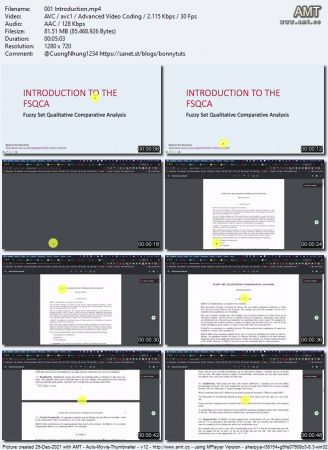Introduction to fsQCA using R
This post was published 2 years ago. Download links are most likely obsolete. If that's the case, try asking the uploader to re-upload.
MP4 | Video: h264, 1280x720 | Audio: AAC, 44.1 KHz, 2 Ch
Genre: eLearning | Language: English + srt | Duration: 35 lectures (4h 36m) | Size: 2.12 GB
Hands on causal relationships
What you'll learn
fsQCA as an analysis of set relations. Sets are usually composed of numbers, or other sets of things.
In fsQCA, the variables are transformed into sets. Then, it is analyzed what combination of causal sets (dependent variables) produces the outcome set.
There are many advantages fsQCA has over traditional correlational analysis like regression: Relationships are asymmetrical, Equifinality and Causal complexity
FsQCA differs from regression analysis in the way it focuses on problems. The focus is on what conditions lead to a given outcome
Requirements
You will learn everything. No previous experience is needed about R programming language.
Description
This course is oriented to everyone that wants to study causal relationships using fuzzy set qualitative comparative analysis (fsQCA). That is, the identification of causal configurations or recipes that lead to a certain outcome.
We use the R programming language although no previous experience is required in its use.
The course ends with a practical example to identify the conditions or configurations that lead a bank to a possible bankruptcy situation.
Once the example is understood, the fsQCA methodology can be applied to a large variety of different scenarios.
The structure of the course is the following
- INTRODUCTION TO FSQCA: includes the explanation of necessity, sufficiency, set membership, calibration, the negation of sets, consistency, coverage, truth table, or different causal solutions
- R INSTALLATION: procedure to install R programming language on a Windows PC and on an Apple computer.
- INTRODUCTION TO R: introduction to R ecosystem, the importance of the working directory, type of R objects, indexing and subsetting data, and introduction to RStudio IDE.
- EXAMPLE OF fsQCA APPLICATION TO BANK FAILURE: data loading, dealing with missing values, the importance of row names, calibration of the outcome and the conditions, selection of fuzzy set variables, truth table construction, and extraction of the different types of solutions: complex, parsimonious and intermediate.
Who this course is for
Everybody with an interest in causal relationships that lead to a given output.
Homepage
Screenshots
Welcome to My Blog - Check it Every Days
If you have any troubles with downloading, PM me
Please Buy Premium Account from my links to get high download speed and support me
Happy Learning!!
Download from free file storage
Resolve the captcha to access the links!
Registered members don't get captcha ... just sayin

